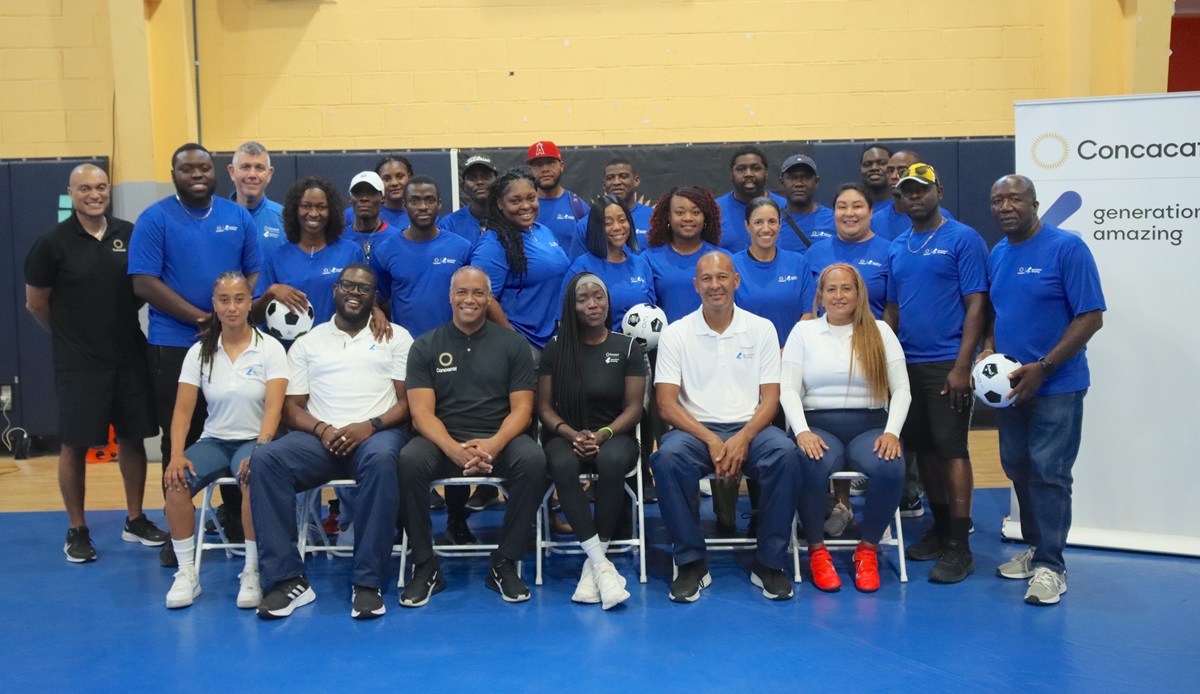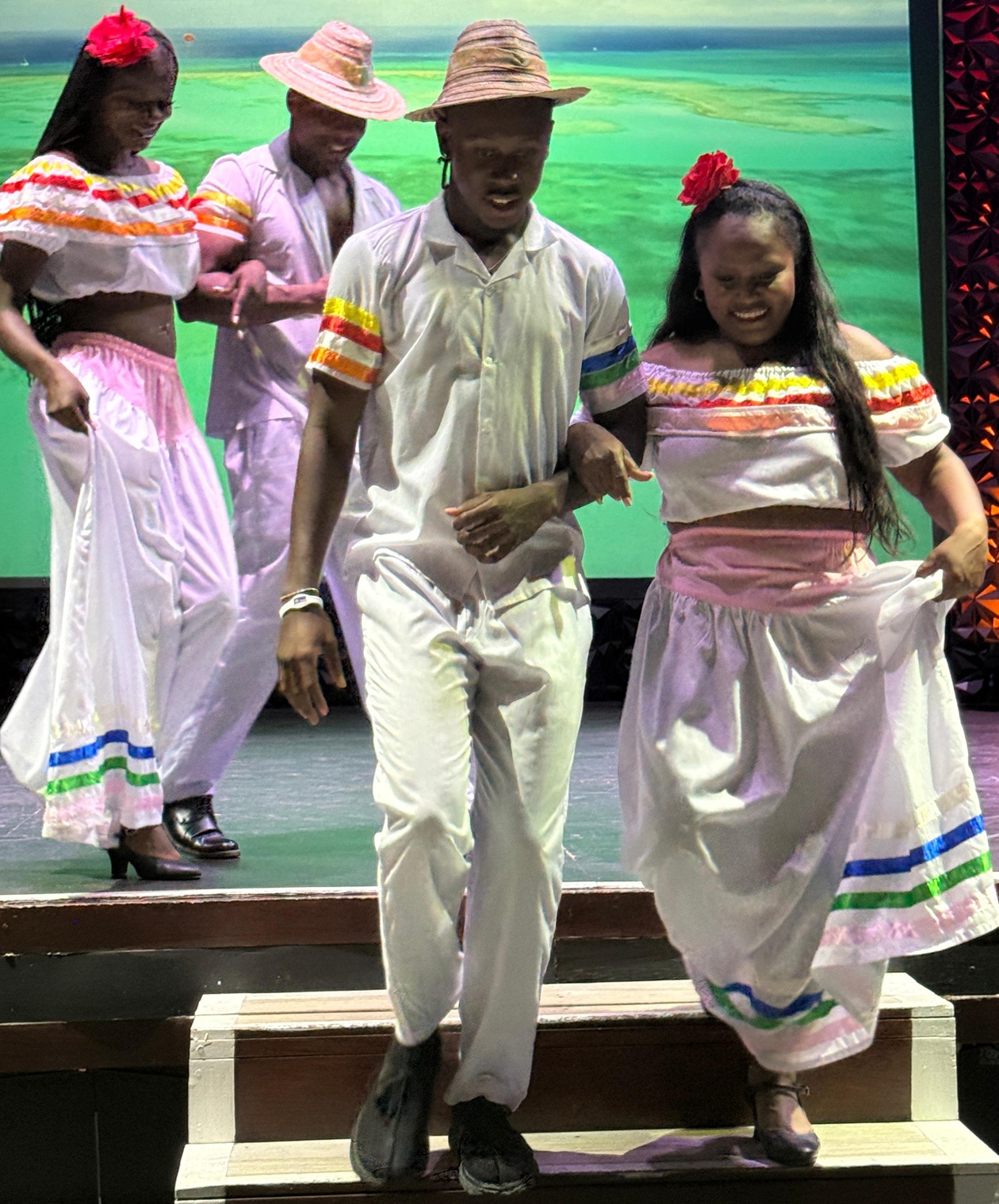News
Concacaf x Generation Amazing, Turks and Caicos Islands Launch
Published
2 years agoon

#TurksandCaicos, May 2, 2024 – Thursday, April 25, 2024, marked a momentous occasion for The Turks and Caicos Islands Football Association with the launch of the Concacaf x Generation Amazing Program. This program, supported by the Turks and Caicos Islands Ministry of Education, is currently benefiting 21 public and private primary schools across the Turks and Caicos Islands, encompassing both sectors of education. The primary objective of the Generation Amazing program is to educate and certify teachers to serve as volunteer coaches in sports development and safeguarding practices. Through this training, coaches will deliver football programs to children, aiming to catalyze positive social change within our communities that will continue to thrive for years to come..
football programs to children, aiming to catalyze positive social change within our communities that will continue to thrive for years to come..
The program not only emphasizes teaching children the basics of football but also focuses on instilling core values like teamwork, respect, and leadership. The initiative offers children the chance to enhance their physical well-being while nurturing essential life skills that can contribute to success beyond the field.
TCIFA President, Sonia Fulford, conveyed her appreciation to Concacaf, Generation Amazing, and the Ministry of Sports of the Turks and Caicos Islands for their involvement and support. She highlighted the significance of the project, pointing up a positive impact on the Education Ministry. Generation Amazing’s initiative is also seen as a valuable opportunity to enhance both the educational and athletic aspects within the community. “We’ll have more well-rounded teachers, and well-rounded students, not only from an educational standpoint, but a sporting standpoint. For us it’s a big win!” The President expressed excitement for the project, foreseeing an increase in skilled players and coaches, ultimately benefiting the organization significantly.
Jarret Forbes, Director of Sports, commented, “We are excited about the launch of the Generation Amazing programme here in the Turks and Caicos Islands. We commend the TCIFA for taking a holistic approach to student empowerment through sports. And we are grateful for the interest and support from CONCACAF and the Department of Education in developing our young athletes.”
Alvin Parker, Deputy Director of Sports, also expressed his enthusiasm regarding the upcoming chance for educators to apply their acquired knowledge. Viewing the term ‘Generation Amazing’ as a rebranding concept for Generation X, it is with high anticipation that the program will inspire and instill optimism within the younger demographic.
A devoted team collaborated diligently to ensure the successful initiation of the program. Spearheading the launch for Concacaf were Jennifer Roche, the Concacaf CSR Coordinator; Andre Virtue, Concacaf Coach Educator; Cristian Cubillas; and Garry Stannecc, the Sport For Development Consultant for Concacaf. The local facilitators comprised Dane Ritchie, TCIFA Technical Director; Olivia Graveley, Director of the Grand Turk Football Program; Yunelsis Rodriguez Baez, Director of Women’s Football; and Damien Grant, TCIFA Coach Educator and South Caicos Football Development Officer. The launch encompassed a comprehensive two-day training session for teachers, which will be followed by a mandatory six-week program involving a minimum of 25 students from each school. The program’s execution will be supervised by our Local Facilitators in with the support of Generation Amazing staff. Furthermore, the program will offer support to schools by furnishing footballs and essential equipment.
Graveley, Director of the Grand Turk Football Program; Yunelsis Rodriguez Baez, Director of Women’s Football; and Damien Grant, TCIFA Coach Educator and South Caicos Football Development Officer. The launch encompassed a comprehensive two-day training session for teachers, which will be followed by a mandatory six-week program involving a minimum of 25 students from each school. The program’s execution will be supervised by our Local Facilitators in with the support of Generation Amazing staff. Furthermore, the program will offer support to schools by furnishing footballs and essential equipment.
Jennifer Roche elaborated on Concacaf’s emphasis on Social Impact strategies, highlighting the significance of extending focus beyond on-field activities. “Last year, our CSR brand, ’The Bigger Game’ launched and the ‘Generation Amazing’ Program is one of the programs under the pillars of access to play and coaches education. This program is focused heavily on capacity building and giving tools to teachers, community volunteers, and other community leaders to empower and change lives through our beautiful game.”
Andre Virtue commented, “Obviously, we see the sport and the opportunity it has to grow. But, at the core of it is the coaches and how the coaches engage with our youth. We see the social issues that our youth already have to deal with on a day to day basis, and the dependence on either the parent or some adult to guide them and to mentor them is assumed. And, there is an intentional approach to how we’re communicating life values as it is very important.” Distinguishing between athletic prowess and life skills, Andre indicated that Coach Educating initiative aims to bridge this gap by aligning sports experiences with essential life lessons. The football field, as a dynamic environment, serves as a valuable classroom where the intricacies of life are intertwined with the game’s dynamics. “There are so many things that happen on the football field that are connected to life. The game is a great teacher, but there is an intentional and deliberate attempt to teach those values. It’s just the winning, the losing, the ups and the downs that come out of the game.”
Dane Ritchie further explained that the program also adopts a personalized approach, focusing on individual needs rather than viewing the children as a collective group, thereby maximizing the positive impact on each child. The aspects of conflict resolution, and nurturing respect are deemed integral to the game and are leveraged to impart essential life skills crucial for their development.
CherylAnn Jones, Permanent Secretary to the Ministry of Education, Youth, Sports, and Social Services, communicated the Ministry’s unwavering support for the Concacaf x Generation Amazing program and its potential to bring about significant transformation. The Ministry’s ethos, centered on Human Capital Development, resonates strongly with initiatives like Generation Amazing, which focus on nurturing leadership qualities, teamwork, and community spirit among today’s youth for the benefit of future generations. “A key tenant of the Generation Amazing program is its emphasis on child safeguarding and so this program aligns with our policy of ensuring that children learn, grow and develop confidently in a safe and nurturing environment. We are delighted to be partners with Concacaf and TCIFA, and applaud these organizations and their continued programs among our young people. We also applaud our principals, physical education teachers, and coaches who will be trained as facilitators in our schools to implement the program, as well as the Sports Commission. We believe that that commitment through football will create positive change.”
For more information, please contact TCIFA Office Manager | Marketing and Communications Coordinator, Candia Ewing at 941-5532 or cewingtcifa@gmail.com
Address:
TCIFA National Academy
Venetian Road
Providenciales
Turks and Caicos Islands
You may like
News
Commonsense, Not Confrontation: Why Kamla Persad-Bissessar Is Right
Published
3 weeks agoon
December 27, 2025
This debate did not start with Donald Trump, and it did not start this month.
For more than a decade, this reporter has had a front-row seat to repeated, urgent calls from across the Caribbean for stronger intervention by the United States in response to gun- and narcotics-fuelled violence that has hollowed out our communities. Long before today’s headlines, leaders warned that transnational gangs were outgunning police, draining public resources and stealing our youngest people.
Much of the public messaging leaned toward calls for fewer guns flowing from the United States, but the practical response from Washington evolved into something else: tactical undergirding of the Caribbean. Training, intelligence sharing, maritime surveillance and joint operations expanded under successive U.S. administrations — Republican and Democrat alike.
Then came Venezuela.
President Nicolás Maduro proved himself an unhinged and destabilising force, openly threatening Guyana’s oil-rich territory and pushing the region to the brink of a conflict no Caribbean state could afford. The United States showed up. The threat of war was blunted. That mattered.
But while geopolitical flames were contained, the narcotics trade exploded.
CARICOM convened emergency meetings on transnational gang violence. Crime became so pervasive that it was formally classified as a public health threat. Entire communities were terrorised. Courts clogged. Police forces stretched beyond capacity.
And now — quietly but noticeably — the tempo has shifted.
While no single forensic study can capture the full picture, it is easily verifiable on the ground that major narcotics busts and trafficking activity have slowed in recent months. Something has changed. Pressure works.
This is the reality Prime Minister Kamla Persad-Bissessar is responding to.
Her critics accuse her of breaking ranks. What she is actually doing is refusing to indulge in strategic hypocrisy — demanding international help to confront narco-terrorism while appearing to defend or excuse the very networks and actors we have spent years condemning.
Sovereignty is not an insult. The Caribbean invokes it constantly. To deny it to the United States — especially when the policies in question were telegraphed months in advance and remain adjustable — is not diplomacy. It is posturing.
What is most troubling is the region’s selective memory. CARICOM has directed months of rhetorical fire at Trump-era policies, yet when disaster struck — from security crises to Hurricane Melissa — the United States remained one of the region’s most reliable supporters. Outcomes matter more than allegiance theatre.
Kamla Persad-Bissessar is not suffering from Trump Derangement Syndrome. She is applying commonsense statecraft. She understands that small states do not gain leverage by moral outrage alone, and that credibility is lost when we appear aligned with individuals, regimes or activities we ourselves have deemed a threat.
Her warning to CARICOM is simple and necessary: do not undermine your own cause.
The Caribbean’s fight against narco-violence, corruption and instability has been long, costly and painful. If pressure is finally producing results, we should be wise enough to recognise it — and brave enough to say so.
Angle by Deandrea Hamilton. Built with ChatGPT (AI). Magnetic Media — CAPTURING LIFE.
News
Beaches Turks and Caicos Showcases and Supports Local Creativity
Published
4 months agoon
September 12, 2025
September 12, 2025
PROVIDENCIALES, Turks & Caicos Islands – The Turks and Caicos Islands are home to a wealth of creativity, from artisans and craft vendors to musicians and performers. Beaches Turks and Caicos, the Caribbean’s leading all-inclusive family resort, has pledged its continued support for these individuals by providing meaningful platforms for them to share their skills and stories with guests from around the world.
The resort’s commitment is most evident in its weekly Cultural Night showcase, where visitors are immersed in the vibrant traditions of the islands. Guests enjoy live performances which feature local music genres such as ripsaw, while artisans display and sell handmade creations. This event not only enriches the guest experience but also strengthens economic opportunities for local entrepreneurs.
Entertainment Division Manager Garett Bailey emphasized the significance of Cultural Night, “we want to showcase everything the Turks and Caicos Islands culture has to offer. Our goal is for guests to leave with a deeper appreciation of the island’s art, music and traditions, while giving local talent the opportunity to share their creativity with visitors from across the globe.”
Beyond Cultural Night, Beaches Turks and Caicos also welcomes local craft vendors onto the resort every Wednesday and Friday where they are offered a direct space to market their goods. Guests have easy access to the Turks and Caicos Cultural Marketplace, where they can purchase authentic local arts and crafts.
where they are offered a direct space to market their goods. Guests have easy access to the Turks and Caicos Cultural Marketplace, where they can purchase authentic local arts and crafts.
Managing Director, James McAnally, highlighted how these initiatives reflect the resort’s broader mission, “we are committed to celebrating and sharing the vibrant culture of these islands with our guests. By showcasing local artistry and music, we not only provide entertainment but also help sustain and grow the creative industries of the Turks and Caicos Islands. From our cultural showcases to nightly live music, we are proud to create authentic connections between our guests and the people of these islands.”
Local musician Keon Hall, who frequently performs at the resort, expressed gratitude for the ongoing partnership, “being able to share my music with Beaches’ guests has created lasting relationships. Some visitors return year after year and request songs from previous performances. This partnership continues to celebrate what we do and strengthens the bond between local artists and the resort.”
The resort’s support of local artisans and entertainers extends beyond business opportunity; it is about preserving heritage and sharing stories. Guests take home more than souvenirs; they leave with experiences that deepen their understanding of Turks and Caicos’ culture and history.
Public Relations Manager, Orville Morgan, noted the importance of this commitment, “for many visitors, these interactions represent their first genuine connection to the Turks and Caicos Islands. From artisans and musicians to farmers and transport operators, our local talent helps shape every guest experience. At Beaches, we are proud to give them the stage to share their stories and their heritage.”
Beaches Turks & Caicos remains dedicated to developing cultural connections and supporting the artisans, musicians and entrepreneurs whose creativity makes the Turks and Caicos Islands unique. Each guest experience is an opportunity to celebrate and sustain the spirit of the islands.
Caribbean News
“Barbecue” is Cooked! US Turns Over 11 Million Haitians into Potential Informants with $5 Million Bounty
Published
5 months agoon
August 12, 2025
August 12, 2025
The United States just set fire to the underworld in Haiti — and this time, the smoke might finally flush out the man many call the most feared in the Caribbean.
On Tuesday, the U.S. government slapped a $5 million bounty on the head of Jimmy “Barbecue” Chérizier, the ex-police officer turned gang boss accused of orchestrating massacres, torching neighborhoods, and strangling Haiti’s capital into chaos. This isn’t just a headline — it’s a full-blown game-changer.
turned gang boss accused of orchestrating massacres, torching neighborhoods, and strangling Haiti’s capital into chaos. This isn’t just a headline — it’s a full-blown game-changer.
That kind of cash — offered under the State Department’s Transnational Organized Crime Rewards Program — is enough to turn the country’s entire population, more than 11 million people, into potential informants overnight. Add the millions in the Haitian diaspora, and Chérizier isn’t just wanted. He’s surrounded.
The Number That Changes Everything
Five million U.S. dollars today equals about 655 million Haitian Gourdes. In a country where many scrape by on less than $5 a day, that’s not just life-changing — it’s life-defining. It’s enough to rebuild homes, put generations through school, or buy a one-way ticket far from the gunfire.
In a place where trust is scarce and survival is everything, that figure is more than tempting — it’s irresistible. For Chérizier, it means every friend could be a future informant, and every loyalist might be calculating the cost of staying loyal.
‘We Will Find Them’ — Jeanine Pirro, U.S. Attorney
Jeanine “Judge Jeanine” Pirro, the U.S. Attorney, set the tone with fire in her voice. “This indictment is the first of its kind,” she announced. “Jimmy Chérizier, also known as ‘Barbecue,’ is a notorious gang leader from Haiti who has orchestrated and committed various acts of violence against Haitians, including the 2018 La Saline attack in which approximately 71 people were killed. He both planned and participated in that massacre.
“Anyone who is giving money to ‘Barbecue’ cannot say, ‘I didn’t know.’ They will be prosecuted, and we will find them. They are supporting an individual who is committing human rights abuses, and we will not look the other way.”
Pirro wasn’t just going after Chérizier. She was sending a warning to the Haitian diaspora accused of feeding his war chest from abroad: the days of claiming ignorance are over.
‘No Safe Haven’ — Darren Cox, FBI
Then came Darren Cox, Deputy Assistant Director of the FBI, delivering the muscle of America’s most powerful investigative force. “There is no safe haven for Chérizier and his network,” Cox declared. “We are closing every link, every cell.” Since January, he said, the FBI has arrested three Top Ten fugitives, taken more than 19,000 criminals off the streets, and seized thousands of tons of narcotics — enough to save millions of lives across the U.S.
The FBI’s Miami and Houston offices have already bagged one of Chérizier’s Viv Ansanm associates inside the United States without firing a shot. “These efforts are a deliberate and coordinated plan,” Cox said, “to protect our communities and confront escalating threats from terrorist organizations like Viv Ansanm.”
‘Three-Year Investigation’ — Ivan Arvelo, HSI
Ivan Arvelo, Assistant Director of Homeland Security Investigations, brought the receipts. “This is the result of a three-year investigation into Chérizier’s procurement networks, cash pipelines, and operational financing that violates sanctions,” he explained. Arvelo described 400 structures destroyed, entire communities erased, and a gang exploiting U.S. dollars, technology, and immigration loopholes to keep its killing machine running. “We tracked how Americans unwittingly bankrolled brutality,” he said — proof that the net is tightening both inside Haiti and abroad.
‘The Worst of the Worst’ — Chris Lambert, State Department
Chris Lambert, representing the State Department’s International Affairs division, gave the political bottom line.
“Mass violence in Haiti must end,” Lambert said. “The instability resulting from Chérizier’s actions fuels illegal migration, regional instability, and transnational crime. We will continue to apply every tool available — including our rewards programs — to stop the spread of unchecked violence, especially to target the worst of the worst criminal leaders threatening the people of our hemisphere.”
instability, and transnational crime. We will continue to apply every tool available — including our rewards programs — to stop the spread of unchecked violence, especially to target the worst of the worst criminal leaders threatening the people of our hemisphere.”
Lambert confirmed what many have long known: Chérizier is not just a gang leader. He commands Viv Ansanm, officially designated in May as a Foreign Terrorist Organization. In the eyes of the U.S., that makes him not just Haiti’s problem — but everyone’s.
Why Haitians May Not Resist
In Haiti, money talks — loudly. And when you put 655 million Gourdes on the table, it shouts.
That’s the kind of figure that turns casual acquaintances into informants and makes even the most hardened loyalist wonder if the payout is worth more than the risk. It’s not a matter of “if” word gets out, it’s a matter of “who will be first to collect.”
For grieving families, it’s a chance at justice. For the desperate, it’s a chance at survival. For Haiti as a whole, it’s hope — wrapped in the most dangerous of temptations.
An Answer to Prayers
For years, Haiti’s headlines have been a scroll of horrors — kidnappings, executions, burned neighborhoods, bodies in the streets. Chérizier’s name has been attached to too many of them.
This move by the U.S. isn’t just strategy. It’s personal. It’s a signal to every Haitian — at home or abroad — that the days of impunity could be ending.
I’ll admit it: when I heard the news, I danced, I sang, and I nearly cried. Not because $5 million is a lot of money, but because of what it means — the possibility, at last, of stopping the man accused of helping turn Haiti into hell on earth.
Four officials, four angles, one mission: Pirro’s fire, Cox’s grit, Arvelo’s precision, Lambert’s conviction. Together, they’ve put the heat on “Barbecue” like never before.
BBQ is cooked. The only question now is: which one of over 11 million potential informants will serve him up?







